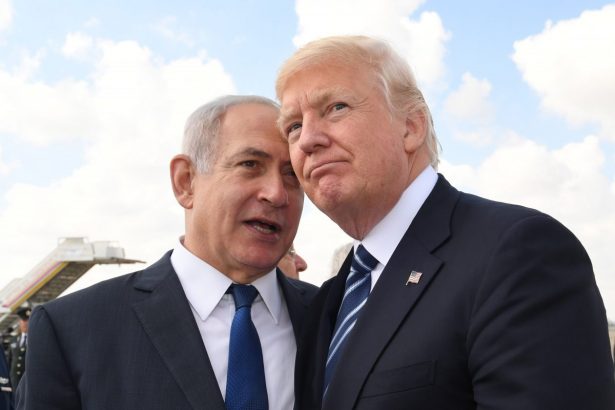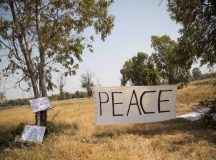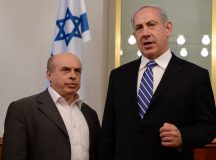Shalom Lipner is a non-resident senior fellow at the Center for Middle East Policy at the Brookings Institution. From 1990 to 2016, he served seven consecutive premiers at the Prime Minister’s Office in Jerusalem. He warns that Trump’s talks of ‘the ultimate deal’ may be overly ambitious and even dangerous for the present juncture. Failure is never cost-free and all parties should think twice before tossing an admittedly far from ideal status quo out the window.
Commonly attributed to the transformative effects of the 1967 Six-Day War, that brought the West Bank and Gaza under Israeli control, the dispute between Israelis and Palestinians actually commenced decades earlier. The die was cast already in 1947, when the Jewish Agency embraced – and Arab leaders rejected – the UN plan to partition Mandatory Palestine into one Jewish state and another Arab one. Israel’s War of Independence the following year launched an elusive search for Arab-Israeli peace that continues to this very day.
Perpetual engagement
Frenetic activity by the world’s foremost statesmen to break the fragile stalemate between Israel and the Palestinians discloses an apparent consensus that diplomatic activism is imperative. International conferences, regional solutions, secret negotiations and an array of other devices have been proposed and tried for the sake of promoting a peace agreement. None has yet produced this precious result. Their failure speaks volumes.
What drives this perpetual engagement? Peace, to be sure, is a lofty objective. Ostensibly, it is also the target of the Israeli and Palestinian leaderships, who have both pledged allegiance to it. But for many of the parties concerned with this mediation, what animates them is the oft-heard assertion that ‘the status quo is unsustainable’. This familiar paradigm, as I wrote earlier this year in Foreign Policy, alleges that some irreparable and potentially uncontainable explosion – figuratively and literally – is imminent, unless decisive action is taken urgently to change prevailing realities in the area. Such thinking has underwritten generations of efforts to conclude a deal between the intractable adversaries. But it is a tired mantra indeed, and deserves renewed consideration.
The aspiration of political leaders to leave behind them a legacy of achievement on the world stage enjoins them to roll up their shirtsleeves and facilitate positive change. This is why we elect them to office. And the tradecraft of the Foreign Service officers in their employ commands that they serve the national interest, fostered generally by making the world safer and more prosperous. Settling for the frustrating role of umpire between unruly foes, occupied solely with confining hostilities to a low flame, is an unsatisfying business for these front-line operatives.
In praise of the status quo
The inevitable question, however, is whether such spirited involvement is necessarily the shortest route to the coveted destination of reconciliation. Palestinians yearn to be free of Israel’s yoke and to plot an independent course to their own destiny. Israelis wish to excise the threat of terrorism and warfare from the routine of their lives, and to flourish. And yet, tinkering with any status quo must be conducted with supreme caution. Casting the status quo into the dustbin of history may be invigorating, but it should be supplanted only by an improved reality. If the resulting situation is more unstable than its predecessor, increased bloodshed could easily follow.
At times, counter-intuitive as it may seem, the status quo is the best available option. US President Donald Trump has said that he fancies brokering the ‘ultimate deal’ in the Middle East. In this, he is not markedly different from many of the American Commanders-in-Chief to have come before him. Their recognition that the US ‘cannot want [a solution to the conflict] more than the parties themselves’ – to paraphrase President Barack Obama from 2010 – has not prevented countless American (and other) mediators from trying to cajole and pressure Israelis and Palestinians towards an agreement.
This enthusiasm has often exacted a severe price. When conditions for progress are not evident, boosting improbable expectations of a breakthrough is not cost-free. The dejection that sets in when hopes are dashed only increases the inflexibility of both parties. This, in turn, increases the difficulty of ever bringing them back to the negotiating table in the future.
President Trump has tasked senior members of his White House staff – chief among them, his son-and-law and close advisor Jared Kushner – with the mission of advancing an accord. In January, Vice President Mike Pence shuttled between a number of the primary stakeholders in the Middle East . And Jason Greenblatt, the president’s special representative, continues to look for possibilities to promote partnership on the ground. But the stated US goal may be overly ambitious and even dangerous for the present juncture. .
Palestinian Authority President Mahmoud Abbas, speaking in Ramallah to the Palestine Liberation Organisation (PLO) Central Council just days before Vice President Pence’s arrival in the region, branded Israel ‘a colonial project that has nothing to do with Jews’. His venomous words exemplified the extent to which no semblance of dialogue is in the offing. Abbas was undoubtedly driven to irrationality partially by US moves to slash Congressional funding for UN Relief and Works Agency (UNRWA), the UN agency that tends to the needs of the Palestinian refugee population, and to confer acceptance on Jerusalem as Israel’s capital city. (The State Department has since notified Congress that the premises of a US embassy in Jerusalem embassy will be inaugurated this coming May, coinciding with Israel’s 70th birthday.) Whatever Abbas’s motivation may have been though, Israel’s prime minister, Benjamin Netanyahu, wasted no time in clarifying that ‘there will not be peace’ as long as Abbas persists to deny the Jewish character of the State of Israel.
Since declaring the death of the Oslo Accords, Abbas has taken his foot off the brakes that would halt the Israeli-Palestinian wagon from careening off an unfortunate cliff. Governments in Israel and the PA are exchanging blame for the impasse and scaling back communications, likely until some incentive should emerge to coax them towards reengagement with each other. This deadlock is bound to endure for a considerable time, however, given that the PA is refusing to talk to Washington– notwithstanding the pronouncement of King Abdullah II of Jordan that ‘we cannot have a peace process or a peace solution without the role of the US’.
Right now, preserving the status quo is challenge enough
Trust between Palestinians and Israelis is virtually non-existent; they nurse a litany of grievances – some primordial, others more modern – that command their focus. The tenuous security cooperation which benefits both parties is subject to repeated attack from those Palestinians who wish to disrupt any ounce of collaboration with the enemy. As such, the order of the day must be to sustain a deteriorating ecosystem, containing a violent eruption and nurture the hope of constructive interaction once the clouds clear.
Meanwhile, President Abbas and Prime Minister Netanyahu have their sights trained on other matters entirely. At age 82, Abbas is now into the 14th year of a four-year presidential term. His health is less than optimal. He is consumed with resentment for having been deserted, as he sees it, by America – which heaps its (mostly rhetorical) largesse upon Israel – and by his fellow Arabs; reports abound that Saudi and Egyptian officials, fully occupied with their own domestic problems, interceded with Abbas and encouraged him to consent to American terms for a Palestinian capital on the outskirts of Jerusalem. Multiple rounds of talks with his rivals from Hamas indicate that Abbas is more fixated on internal Palestinian reconciliation than on peace with Israel as his legacy. In this state of affairs, he has scant cachet to talk with Israel at any rate.
Netanyahu’s attention has been invested further afield. Abbas’s disparaging remarks about Israel’s pedigree found Netanyahu in the middle of a triumphal visit to India, where he had a 130-member economic delegation in tow. That trip was followed by meetings with presidents Vladimir Putin and Donald Trump and by appearances at the World Economic Forum in Davos and the Munich Security Conference. When at home in Israel, Netanyahu finds the bulk of his concentration absorbed with his legal perils, facing the prospect of serial corruption charges – and with the wrangling that this has spurred within his governing coalition . Wall-to-wall condemnation of Abbas’s recent tirade among Israeli politicians almost guarantees that Netanyahu can ignore Palestinian wishes with virtually no political consequences.
The interim period will witness little more than brinkmanship, with Israel and the Palestinians using the US as a foil for their claims. Israel will appeal to the administration for greater latitude to pursue policies in keeping with the platform of its right-wing government and, judging from recent experience, likely succeed on some counts. The Palestinians will shout betrayal and become further entrenched in their resistance to contacts with Israel. This scenario is precarious particularly because the US is signalling a retreat from active involvement in the Middle East, while Russia is surging as a preeminent force in deciding regional fates.
No, the status quo is not ideal, but securing it is the order of the day
None of this means the status quo is an ideal condition. In fact, the status quo is changing all the time, albeit at a gradual pace. What it does argue, however, is that present circumstances present only worse alternatives. Those advocating what they claim are better ones are engaging in wishful thinking since their designs are non-starters in the existing political alignment. In the absence of the conditions and the mind-sets required for genuine progress, and with flaring hotspots like Syria and the Sinai on Israel’s borders, what qualifies as an imperfect status quo is worth safeguarding – especially if the only viable substitutes will engender greater antagonism.
That said, even such a limited objective as securing the status quo will require heavy lifting. Small steps can and should be taken, nonetheless, to ensure that progress can take root eventually. In February, when there was little expectation of high-level interaction between Israelis and Palestinians, Israeli Finance Minister Moshe Kahlon travelled to Ramallah to meet with both his counterpart Shukri Bishara and Palestinian Prime Minister Rami Hamdallah. The importance of keeping these channels open cannot be overstated. And one month earlier, in January, Israel consented to introduce high-speed mobile service in the West Bank.
Neither of these events can be considered a great leap forward, but modest achievements like these do contribute to quality of life and should be cultivated. Over time, they infuse a sense of normality and restore confidence that real progress is not impossible. Perhaps not under current management, but with the help of visionaries who are able to see beyond the zero-sum construct of the present moment.
At Cairo’s Al-Azhar University in January, Abbas referred to President Trump’s decision on Jerusalem as a ‘sin’ and warned that Jerusalem is ‘the gate of peace and war’. One week later, Vice President Pence told the Israeli Knesset in Jerusalem that the same Donald Trump has ‘done more to bring [the US and Israel] closer together than any president in the past 70 years’. Loaded statements like these risk unleashing the more aggressive impulses of some Israelis and Palestinians. Everybody, on all sides, needs to take a timeout.
This is a time for cooler heads to prevail. Friends and neighbours should counsel both Israelis and Palestinians to tone down their language and not jeopardise the teamwork, particularly on security, that has survived against all odds.
The status quo has many detractors. But as we stand on the cusp of a potential regression between Israelis and Palestinians, concerned parties should all think twice before tossing the status quo out the window. If things do ultimately spin out of control, the much-maligned status quo will suddenly look very attractive in our rear-view mirror.










































